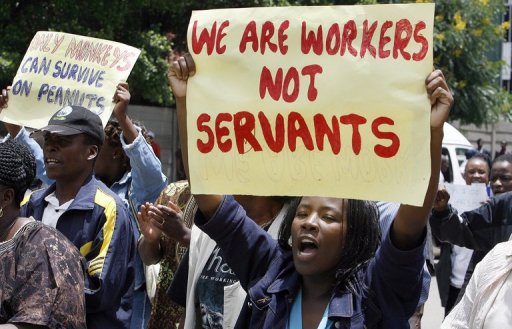Chantelle Bongubukhosi Ncube
During the recent World Teachers’ Day commemorations, Zimbabwean teachers heightened their call for a significant decent salary increase, demanding a minimum monthly wage of US$1,260.
This comes against a backdrop of an increasingly strained economy characterized by rampant inflation, rising costs of living, and the devaluation of the Zimbabwean dollar (ZiG).
Currently, teachers in Zimbabwe earn approximately US$300 per month—a figure far below the food poverty datum line, which now stands at over US$500.
This financial pressure has left educators struggling to afford basic necessities such as food, healthcare, and housing. The teachers argue that their salaries are no longer sufficient to meet the ever-escalating prices of goods and services, let alone enable savings or a decent standard of living.
The Amalgamated Rural Teachers Union of Zimbabwe (ARTUZ), one of the most vocal teachers’ unions in the country, issued a statement emphasizing the inadequacy of current wages.
“ARTUZ calls upon the employer to review salaries and pay a fair wage that enables teachers to cater for basics and have savings. A minimum of US$1,260 is all that teachers are demanding,” the statement read.
Economic Realities Worsen
Zimbabwe’s economy has faced challenges for over two decades, with inflation reaching alarming levels. According to recent data from the Zimbabwe National Statistics Agency (ZIMSTAT), inflation was recorded at 77% in August 2024, but international renowed Economist Steve Hanke argues that Zimbabwe’s inflation has reached galloping levels of 880%.
The local currency has lost significant value, forcing many professionals to seek US dollar-based salaries or leave the country altogether in search of better opportunities.
Economists predict that with such inflationary pressures, teachers’ wages will continue to be eroded unless decisive policy interventions are made.
John Mangena, an economist based in Harare, points out,
“With inflation climbing at the rate it is, wage reviews are no longer a solution—teachers need their salaries tied to a stable currency to maintain purchasing power.”
One teacher from Bulawayo, who preferred to remain anonymous, shared her experience:
“I have to take on extra tutoring work during weekends just to keep my family afloat. After paying rent and buying groceries, I’m left with almost nothing. We are asking for a living wage, nothing more.”
Another teacher from a rural district expressed frustration at the disparity between their salaries and the demands of modern life.
“It’s very difficult for those of us in rural areas. Prices for basic goods, such as mealie meal and cooking oil, are the same everywhere, but our salaries are way behind. We have to make sacrifices—sometimes at the expense of our children’s education.”
This situation reflects a larger issue facing many public sector workers in Zimbabwe, including healthcare professionals, police officers, and civil servants, all of whom have expressed grievances regarding their salaries. Earlier this year, a strike by nurses in Harare also centered around poor wages and working conditions. The country’s economic woes have strained the government’s ability to meet public sector demands, with little relief in sight.
Teachers, however, argue that education is the bedrock of the country’s future. As ARTUZ’s statement highlights, an investment in teachers’ livelihoods directly benefits students and, by extension, the nation’s development.
As the 2025 academic year approaches, the government faces mounting pressure to address teachers’ salary concerns. Failure to do so may lead to widespread industrial action, disrupting the education sector and leaving thousands of students without teachers. For now, teachers remain hopeful that their demands will not fall on deaf ears.
The plight of Zimbabwean teachers brings to the forefront the broader economic challenges plaguing the country. With inflation decimating salaries and the value of the local currency rapidly declining, the call for a salary increase is more than justified. As teachers continue to demand a living wage, the government’s response will not only affect the education sector but also set the tone for addressing the overall economic instability in Zimbabwe.
Zim GBC News©2024


